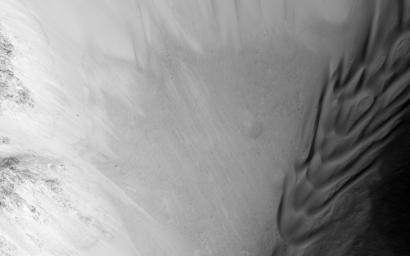
|
Eastern Valles Marineris Bedrock Stratigraphy and Falling Dunes
- Click the image above for a larger view
- Full-Res JPEG (2880 x 1800) (484.3 kB)
- Full-Res TIFF (2880 x 1800) (5.2 MB)
Caption:
This image shows a transect of approximately 8-kilometers of Coprates Chasma wall stratigraphy, which includes (moving down sequence): the southern plateau, wall spurs, fans of eroded material, gullies, sand dunes, and canyon floor.
Dunes located in the center left show slip faces on the downhill side and aligned with the local gradient, indicating down slope transport ( see subimage, white arrow ). These "falling dunes" are a type of topographically-controlled sand dune that formed when down-slope winds were focused by the gully topography. Although rare across Mars, eastern Coprates Chasma has an abundance of these falling dunes, particularly on north-facing walls.
As with all dunes, wind regime, sediment supply, topography, and climate are all important factors in where dunes form and persist. An abundant sand supply from local wall layer and persistent down-slope winds are likely contributors to why these dunes are so common here.
Note: the above image (and the subimage) are non map-projected, so North is approximately down).
Also take a look at the digital terrain map made with this image pair.
Background Info:
HiRISE is one of six instruments on NASA's Mars Reconnaissance Orbiter. The University of Arizona, Tucson, operates the orbiter's HiRISE camera, which was built by Ball Aerospace & Technologies Corp., Boulder, Colo. NASA's Jet Propulsion Laboratory, a division of the California Institute of Technology in Pasadena, manages the Mars Reconnaissance Orbiter Project for the NASA Science Mission Directorate, Washington.
Cataloging Keywords:
| Name | Value | Additional Values |
|---|---|---|
| Target | Mars | |
| System | ||
| Target Type | Planet | |
| Mission | Mars Reconnaissance Orbiter (MRO) | Mariner |
| Instrument Host | Mars Reconnaissance Orbiter | |
| Host Type | Orbiter | Flyby Spacecraft |
| Instrument | High Resolution Imaging Science Experiment (HiRISE) | |
| Detector | ||
| Extra Keywords | Color, Dune, Map | |
| Acquisition Date | ||
| Release Date | 2013-05-22 | |
| Date in Caption | ||
| Image Credit | NASA/JPL-Caltech/Univ. of Arizona | |
| Source | photojournal.jpl.nasa.gov/catalog/PIA17730 | |
| Identifier | PIA17730 | |
